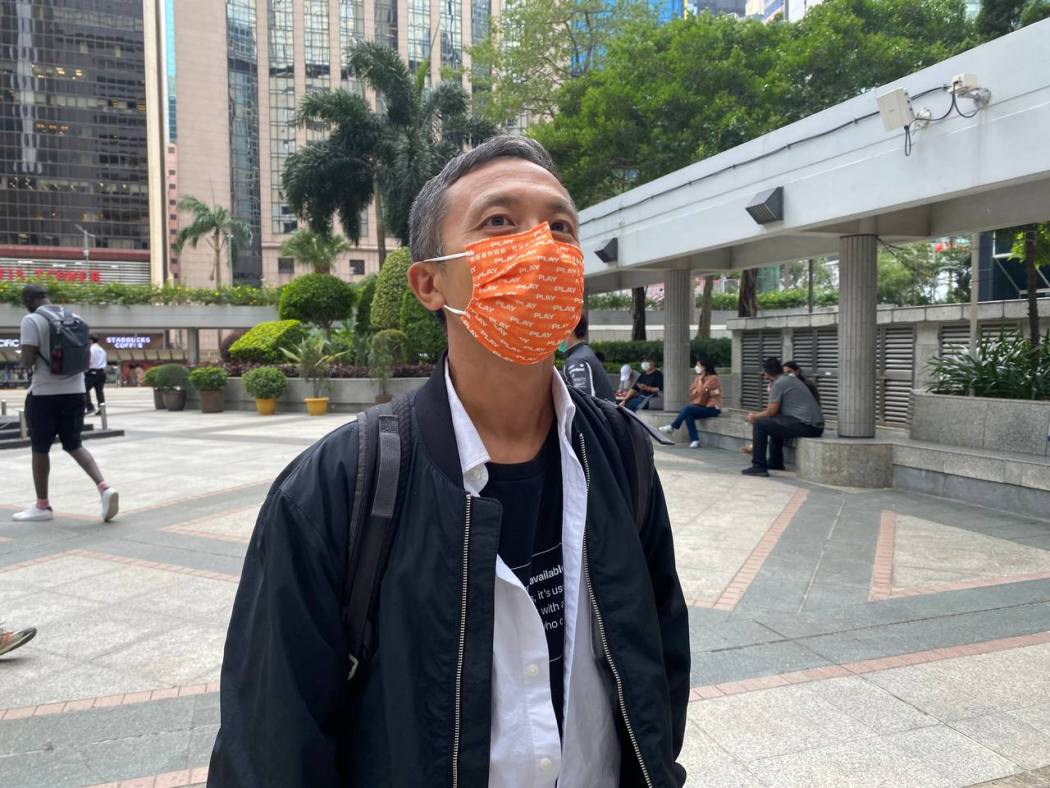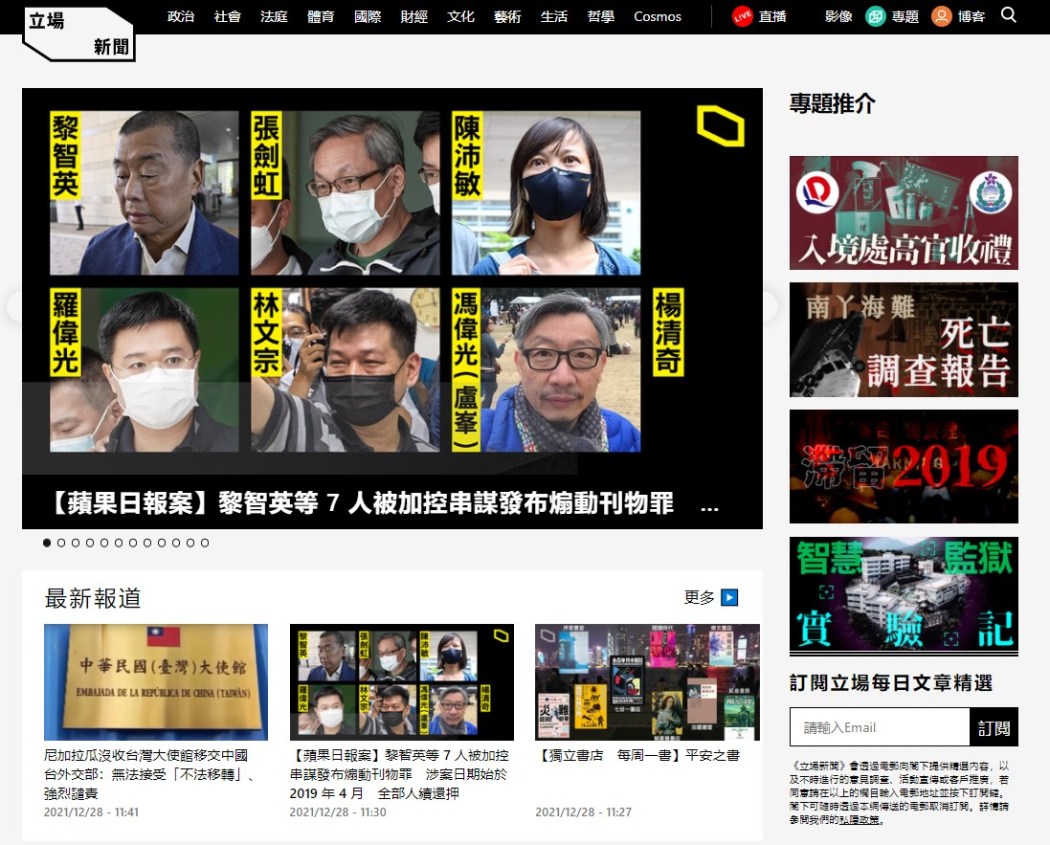A Hong Kong journalist has completed his testimony over 17 allegedly “seditious” articles published by defunct news outlet Stand News while he and another editor were at the helm after 36 days on the stand. The trial, which began last October and was scheduled to last for 20 days, will hear closing arguments in June.

Chung Pui-kuen, former chief editor of Stand News, and Patrick Lam, former acting editor of the outlet, stand accused of conspiring to publish seditious publications along with the outlet’s parent company, Best Pencil Limited.
The duo appeared before judge Kwok Wai-kin on Monday as the trial entered its 52nd day. As Chung’s time on the witness stand drew to a close, the defence told the court that Lam had chosen not to testify.
The defence and the prosecution will present their closing arguments from June 19 to 21.
Debates over fake news
Close to the end of Tuesday’s hearing, the judge asked Chung if the saying “the more the truth is debated, the clearer the truth becomes” was still true in this era, citing a commentary by veteran journalist Allan Au that was never submitted to the court as evidence.
Au, a columnist for several outlets including Stand News and Ming Pao, was arrested last year for violating the sedition law although no charge was brought against him. He was sitting in the public gallery on Tuesday when Kwok cited him.

In an op-ed about US TV networks cutting away from then-US president Donald Trump in 2020, Au wrote that “truth won’t emerge after debates” in the internet era as fake news spreads faster than truth. “Some people just want to believe what they want to believe,” he wrote.
Au also said that the media should be the gatekeepers, providing the public with fact-checked information.
“You said you would publish any article that makes sense, and that you never practiced censorship. Yet, Au said the media had to filter [fake news] too,” Kwok asked.
Chung said that he would not publish commentaries that were groundless or meaningless, yet he did not see how any of the 17 articles submitted as evidence were based on fake news or unfounded information.
The 17 allegedly seditious Stand News articles – click to view
- Profile of Gwyneth Ho, a candidate in the 2020 legislative primaries held by the pro-democracy camp, published on July 7, 2020.
- Profile of Owen Chow, a candidate in the 2020 legislative primaries held by the pro-democracy camp, published on July 27, 2020.
- Profile of Fergus Leung, a candidate in the 2020 legislative primaries held by the pro-democracy camp, published on August 12, 2020.
- Commentary by Chan Pui-man, Apple Daily’s former associate publisher, criticising speech crimes, published on September 12, 2020.
- Commentary by Nathan Law, a former lawmaker now in self-exile, on “how to resist” under the national security law, published on September 20, 2020.
- Profile of Law on his “battlefront” of calling for sanctions on the Hong Kong government in the UK, published on December 9, 2020.
- Commentary by Law on “resilience in a chaotic world,” published on December 13, 2020.
- Feature interview with Ted Hui, a former lawmaker in self-exile, after he fled Hong Kong with his family, published on December 14, 2020.
- Feature interview with Baggio Leung, a former lawmaker in self-exile, as he called for sanctions on Hong Kong and a “lifeboat scheme for Hongkongers,” published on December 15, 2020.
- Commentary by Sunny Cheung, an activist in self-exile, responding to being wanted by the Hong Kong government, published on December 28, 2020.
- Commentary by Allan Au, a veteran journalist, on “new words in 2020,” which included “national security,” “disqualified” and “in exile,” published on December 29, 2020.
- Commentary by Au calling a national security trial a show, published on February 3, 2021.
- Commentary by Law paralleling the mass arrests of candidates in the democrats’ primaries to mass arrests during Taiwan’s white terror period, published on March 2, 2021.
- Commentary by Au accusing the authorities of “lawfare” in usage of the sedition law, published on June 1, 2021.
- Commentary by Au describing Hong Kong as a disaster scene after the implementation of national security law, published on June 22, 2021.
- Feature about CUHK graduates’ march on campus to mourn the second anniversary of the police-student clash in 2019, published on November 11, 2021.
- Report on Chow Hang-tung’s response to being honoured with the Prominent Chinese Democracy Activist award, published on December 5, 2021.
“Fake news is also a reason news media should maintain their credibility, to serve as a place where people know they can find diverse and factual information. No media should be restricted by draconian laws, especially in authoritarian states where those laws could be abused, “ Chung said.
Chung added that fake news was a major challenge, and discussions regarding how to deal with fake news continued. However, democratic governments rarely intervened or threatened news media with criminal law, he said.
Kwok followed up and asked the journalist if he would publish an article based on a half truth, presenting a hypothetical scenario in which he and Chung both slapped each other.

“Would you publish an article that only mentioned you were slapped by me?” the judge asked.
Chung modified the scenario to him being slapped by a police officer after he had slapped another person. “I would mention this in the news report, too,” Chung said.
Kwok then concluded that the phenomenon of echo chambers – internet users being fed information that reflects their existing stance or interests – existed. Chung agreed.
The judge also asked the former chief editor what channels the government could use to deliver information, as Chung said in previous hearings that the authorities had more power to speak in the public sphere.
“People can criticise the government twenty-four hours a day, seven days a week, yet the government cannot work overnight,” Kwok said.
Chung, in response, said the government could work around the clock, too, if if it wanted to.
Other new outlets
During the morning session, the defence continued to re-examine Chung over the final six articles, including four op-eds by Au, a commentary by self-exiled former lawmaker Nathan Law, a feature about a march of the Chinese University of Hong Kong (CUHK) campus, and a news report about Tiananmen vigil activist Chow Hang Tung.
Among the 17 articles, two were published after Chung had stepped down as as editor-in-chief after his wife, the associate publisher of another defunct news outlet Apple Daily, was arrested in mid-2021. Regarding those two, Chung said he would testify from the perspective of a Stand News reader.

In response to the prosecution’s allegations that the articles were “groundless” and “misleading,” defence counsel Audrey Eu cited dozens of feature stories published by other outlets to prove Stand News’ credibility.
“What makes the Stand News article different from the other articles? Making it “seditious?” Eu asked when referring to the feature about CUHK graduates’ march on campus to mark the second anniversary of the police-student clash in 2019.
“I’d say the article published by Stand News was quite similar to the ones written by Ming Pao and HK01,” Chung said, adding that the story by Ming Pao could be considered more sympathetic to the CUHK students.
In the article, a CUHK graduate recalled that she had heard a police officer saying “burn it all” after a mattress caught fire and black smoke was seen rising above the campus. Security chief Chris Tang later called the claim “fake.”
Kwok, after watching a video submitted by the defence, confirmed that a police officer could be heard saying “burn it all” at CUHK, but he questioned whether the officer was describing the scene, or commanding his fellow officers to “burn it all.”
“I just want to emphasise that the police actions were not the focus of our discussion, my point is that [Stand News] was not producing fake news,” the defence counsel said.
Eu also used Chung as an example to support a claim made by Au in one of his op-ed that political defendants were “jailed” before conviction as most of them were not granted bail.
“You were detained for almost a year, too, right?” Eu asked. Chung agreed.
Sedition law
The anti-sedition legislation, which was last amended in the 1970s when Hong Kong was still under British colonial rule, falls under the city’s Crimes Ordinance. It is separate from the Beijing-imposed national security law, and outlaws incitement to violence, disaffection and other offences against the authorities.
Non-profit digital news outlet Stand News ceased operations and deleted its website in December 2021 after its newsroom was raided by over 200 national security police officers. Seven people connected to the independent outlet were arrested on suspicion of conspiring to “publish seditious publications.” However, only ex-chief editor Chung Pui-kuen, acting chief editor Patrick Lam and parent company Best Pencil (Hong Kong) Limited were charged under the colonial-era law.
Advocacy groups, the UN, and western countries criticised the arrests as a sign of declining media freedoms, while now-Chief Executive John Lee condemned “bad apples” who “polluted” press freedom following the raids.
The trial began in October 2022 with the court considering 17 allegedly seditious articles, including interviews, profiles, hard news reporting and opinion pieces. Sedition carries a maximum penalty of two years behind bars.
Support HKFP | Policies & Ethics | Error/typo? | Contact Us | Newsletter | Transparency & Annual Report | Apps
Help safeguard press freedom & keep HKFP free for all readers by supporting our team
























